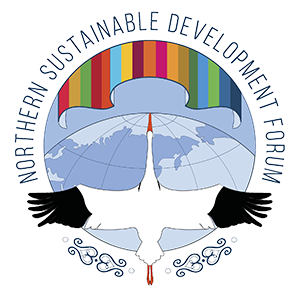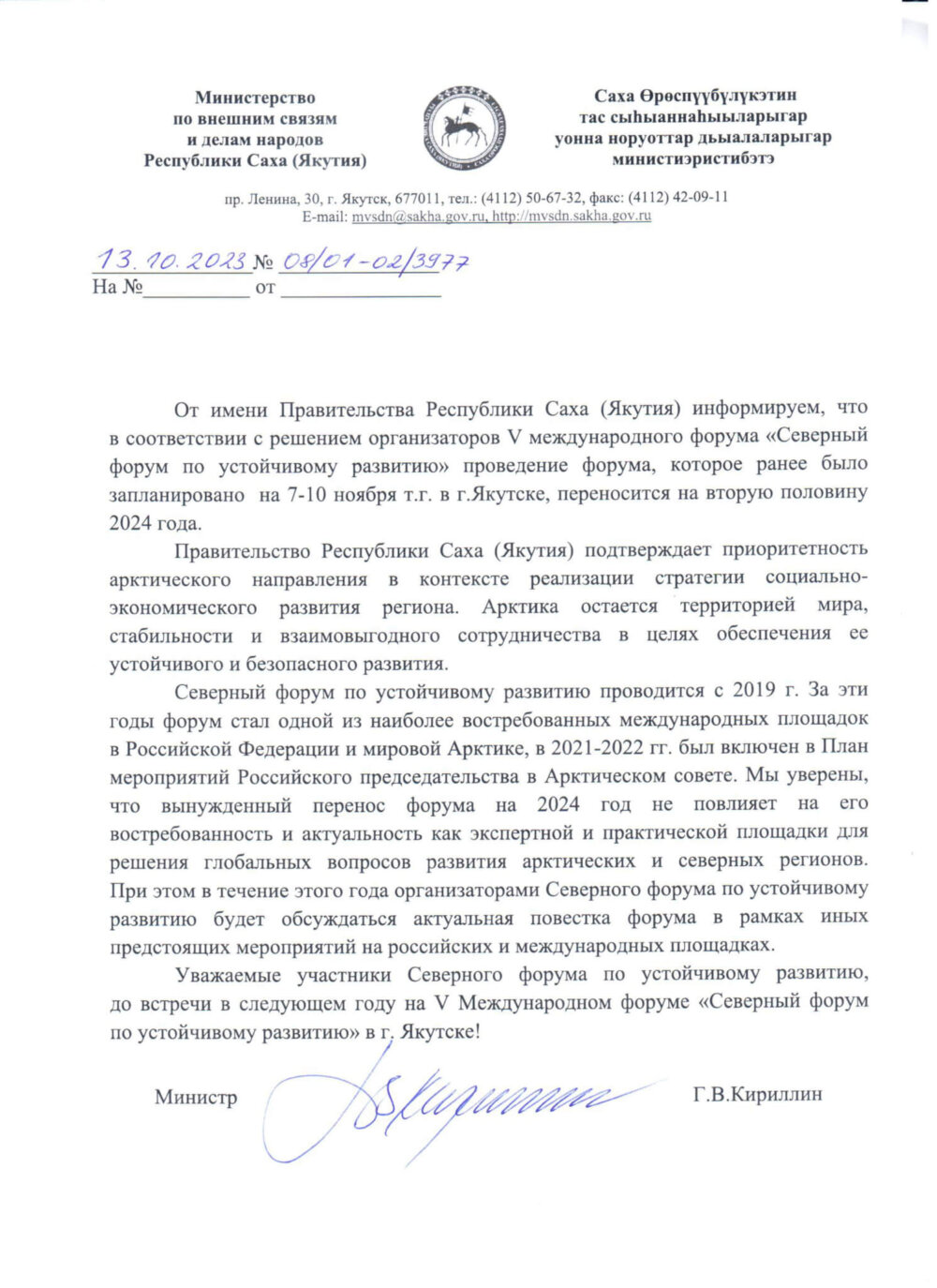X Russian-Chinese Academic Meeting «Bilateral and Multilateral Interregional Interaction in the Arctic» was concluded in Saint Petersburg. Within the framework of the Jubilee Seminar, experts from SPU raised the topics of environmental protection and rare earth metal mining in the Arctic region.
The meeting was welcomed by the Vice-President of the Russian Geographical Society, Director of the Institute of Earth Sciences of SPU Kirill Cheryakov; Dean of the Faculty of International Relations of Saint Petersburg University Professor Irina Novikova; Acting Deputy Rector for International Cooperation of SPU Valeria Babushkina; Vice-President of the Ocean University of China Professor Li Huazjun; and Dean of the Faculty of International Relations and Public Administration, Ocean University of China Professor Wang Qi.
The first speaker from Saint Petersburg University was a PhD of Law Science, Associate Professor of the Department of World Politics Marina Ermolina with the report «Legal Aspects of Environmental Protection in Mining in the Arctic Zone of the Russian Federation».
“Nowadays the State policy in the Arctic Zone of the Russian Federation currently focuses mainly on the extraction of natural resources. However, as Russian scientists have noted, the Arctic is not just a repository of minerals. From an international perspective, the region’s territory plays a significant role in the conservation of global biodiversity: it is inhabited by numerous species of terrestrial and marine mammals, feathers and aquatic biological resources, and is unique in the plant world. The vulnerability of the region has been confirmed by international instruments and numerous scientific studies. The consequences of climate change are already real, as confirmed by the recent report of the United Nations Secretary-General”, - Assistant Professor Marina Yermolina told.
Marina Yermolina added that, as a party to multilateral international treaties, Russia is obliged to ensure compliance with the 1992 UN Framework Convention on Climate Change, the 1992 UN Convention on Biological Diversity, the 1982 UN Convention on the Law of the Sea, International Convention for the Protection of the Marine Environment from Ships 1973/78 and other international instruments. Like other countries, Russia is participating in the implementation of the Sustainable Development Goals to 2030.
These goals are aimed at balanced sustainable development and should be integrated into national economic, social and environmental policies and programmes.
Assistant Professor of SPU Marina Yermolina
“In the light of the Arctic policy, the objectives of environmental protection and sustainable development at the national level are combating climate change, conservation of terrestrial ecosystems, protection of the marine environment, partnership in sustainable development”, - Assistant Professor of SPU clarified.
She noted, however, that mining in the Arctic region was a promising area of cooperation between the Russian Federation and the People’s Republic of China. The development of this sector is directly linked to the social and economic development of the northern territories of Russia. “Russia is interested in foreign investment and China is interested in access to natural resources and transport links. The Russian Federation, for its part, is not in a position to fully manage natural resources due to the lack of the best available technologies (BAT)”, - she said.
According to Marina Yermolina, the application of the BAT will contribute to the creation of the necessary conditions for the technological re-equipment of the Russian Federation’s industrial complex, increase its competitiveness and at the same time reduce the negative impact on the environment. “The experience of foreign countries in applying standards based on indicators of the best available technologies has shown the effectiveness of such an approach for reducing anthropogenic pressures on the natural environment”, concluded the expert of SPU.
The second speaker from the University was Chief Scientist of the Laboratory of Asian Economic Research, Professor of Risk Management and Insurance Professor Sergey Belozerov. He presented a paper “Cooperation of Russia and China in the field of rare earth metals mining in the Arctic” prepared jointly with Assistant Professor of SPU Elena Sokolovskaya.
“Currently, rare earth elements are one of the necessary elements for the implementation of green energy technologies: wind turbines, electric vehicle engines, consumer electronics, smartphones and various batteries (for example, 9 out of 17 rare earth elements are used in the manufacture of one of the world's most popular smartphones). With the spread of high-tech products, the demand for rare earth metals is growing”, - the authors of the report noted.
According to Sergei Belozerov, today China accounts for about 58% of the world production of rare earth metals, the country is also a leader in the processing and exporingt of these metals, despite the tightening of the rules for their export in January 2021. At the same time, Russia is now in second place in the world in terms of explored reserves of rare earth metals, while its production in the country is less than 2% of global production.
The professor at St. Petersburg State University emphasized that all the mining of rare earth metals in the Arctic zone of Russia falls on the loparite ores of the Lovozero deposit (about 40%) and apatite-nepheline objects of the Khibiny group (about 60%) in Murmansk Oblast.
“Separately, we focus on the Tomtor field in Yakutia, which, in terms of explored reserves and concentrations, exceeds all known world analogues. The project for the development of this field is included in the state program "Development of Industry and Increasing its Competitiveness", and it is planned to start mining by 2022. The Tomtor deposit contains significant reserves of neodymium and praseodymium oxides, which are key in the production of permanent magnets. From an economic point of view, the magnet production sector leads by a significant margin among other sectors that consume rare earth elements: it accounts for about 80% of the world market value of rare earth elements, but only about 30% of the world's deposits”, - said Sergey Belozerov.
Thus, mineral deposits that are ready to “serve” the needs of this sector are promising and the most attractive for investment.
Cooperation between Russia and China in the extraction of rare earth elements in the Arctic is possible under the conditions of the introduction by Russia of the principles of rational protectionism. In particular, the admission of Chinese companies to the fields on the Russian Arctic shelf if Russia controls the process of managing companies.
Professor at St. Petersburg State University Sergei Belozerov
“Because otherwise there is a high likelihood that rare earths products will pass through the value chain in China. Under these conditions, Chinese companies will be able to neutralize the consequences of reducing the quota for domestic production of rare earth metals,” - explained, Professor at St. Petersburg State University Sergei Belozerov.
Within the framework of the X Russian-Chinese Academic Meeting “Bilateral and Multilateral Interregional Cooperation in the Arctic”, graduate students of St. Petersburg State University also presented their reports: Ruslan Bu made a presentation “The Murmansk Region as an educational and research projects for personnel training in the Arctic region”.
The jubilee meeting ended with a report by, PhD in History, Head of the St. Petersburg State University Master's Program "International Cooperation in the Field of Environmental Protection and Development",associate professor at St. Petersburg State University Nadezhda Kharlampyeva. The report was called “The tenth anniversary of the Russian-Chinese academic meeting: the evolution of the Arctic theme”.
With the help of our site, the Arctic has become a full-fledged object of study for the Chinese academic society..
Associate Professor of St. Petersburg State University Nadezhda Kharlampieva
“The annual meetings have also played a role in shaping the Arctic policy of the PRC government. Thus, the first features of China's White Paper on international cooperation were discussed precisely within the framework of these seminars. For ten years, we have managed to create a Russian-Chinese space for the study and research of the Arctic,” stressed Nadezhda Kharlampieva.
It should be noted that St. Petersburg State University, within the framework of the organization of public events "Arctic Policy in the XXI Century" since 2009, has been initiating several international meetings on Arctic topics. Since 2011, scientists from the Department of World Politics at St. Arctic and The Institute of Law and Public Administration of the China Oceanic University (Qingdao), on the initiative of Professor Guo Peizing of the China Oceanic University and Associate Professor of St. Petersburg State University Nadezhda Kharlampieva, began to study the issues of Russian-Chinese international cooperation in the Arctic.

